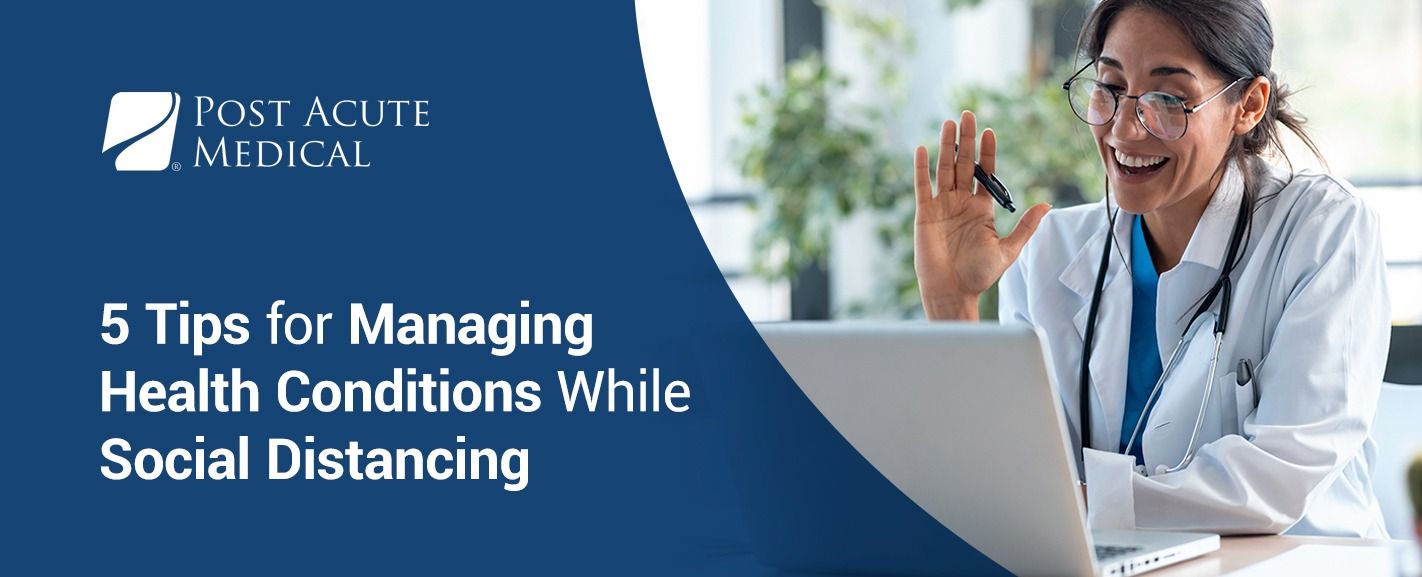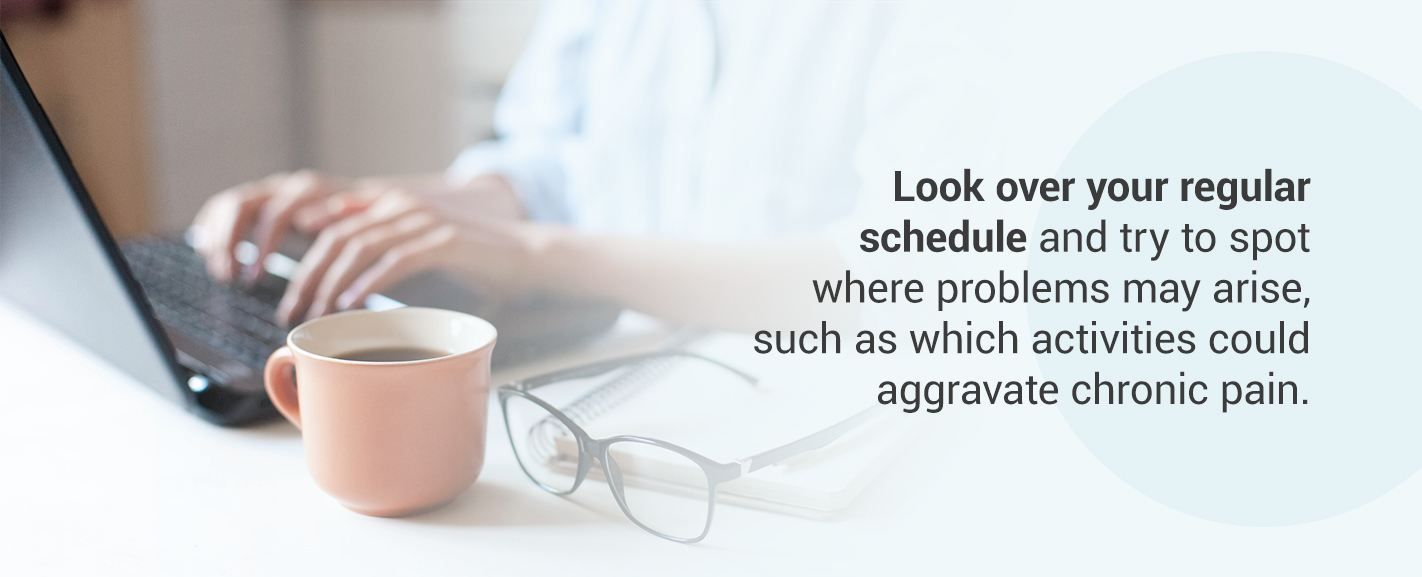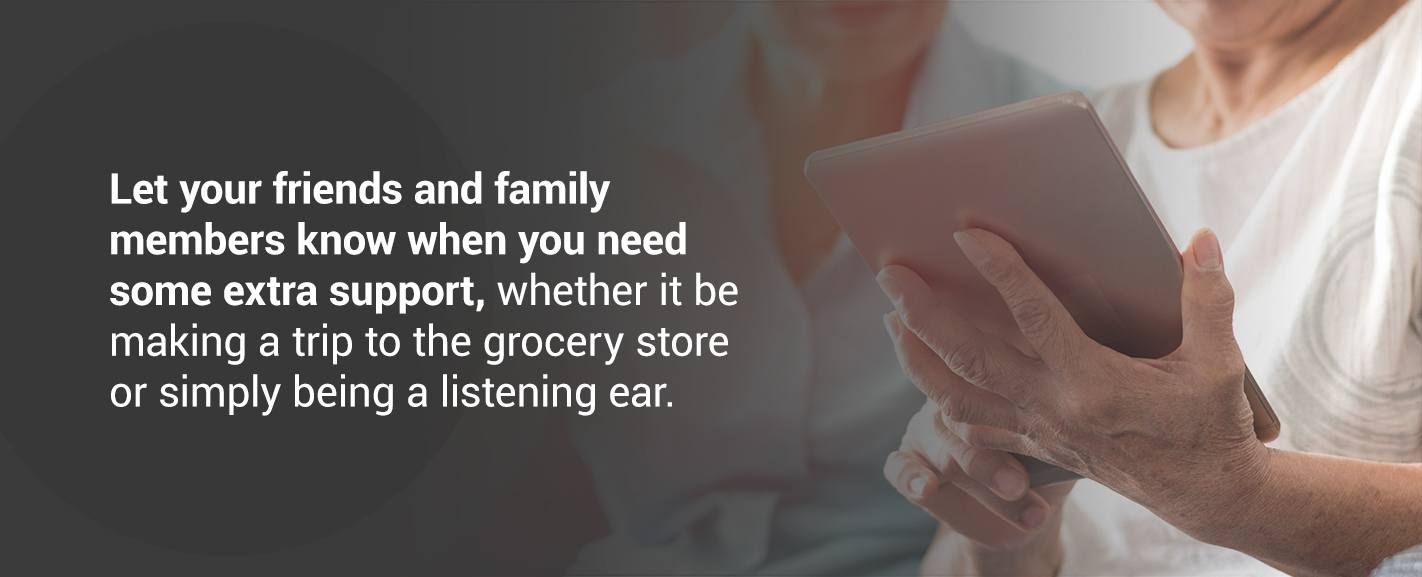5 Tips for Managing Health Conditions While Social Distancing

Maintaining the social distancing guidelines set out by the Centers for Disease Control and Prevention (CDC) may make completing everyday activities more challenging, especially for those with a chronic condition. However, with a bit of innovation and resourcefulness, it is possible to continue making progress regarding your physical health during COVID-19.
Explore Health Services Offered by PAM Health
In this article, we will discuss five tips for managing physical health conditions while social distancing and following CDC recommendations. Follow the suggestions below to make balancing your health condition with social distancing a bit easier:
1. Establish a Flexible Routine
Having to take time off from work and other meaningful activities can disrupt your everyday routine and increase feelings of sadness or depression. To avoid feeling alone or depressed, do your best to stick with a daily routine that resembles normalcy during these uncertain times. A dependable routine will give you a sense of purpose and order while filling your days with healthy pastimes and productive tasks.
Although it is important to establish a daily routine, make sure you pace yourself and allow for flexibility in completing tasks. Take regular breaks and spread your activities throughout the day or week to prevent feelings of fatigue, breathlessness or chronic pain. Finally, be sure to incorporate activities you enjoy into your routine to maintain a healthy balance of work and play.
2. Set New Goals
It is OK if the current changes surrounding the COVID-19 pandemic have affected your goals. These unpredictable circumstances make it difficult to proceed with business as usual, which means you may need to adjust the goals you originally set. This does not mean you have failed. It simply means you are adapting to a challenging situation and unforeseen obstacles.
While you should reevaluate your goals and amend them to account for following proper social distancing protocols, you should not scrap them altogether. Goals can give us a sense of purpose and help us track our progress, both of which are important for getting through these trying times. Keep aiming high and logging your progress without putting too much pressure on yourself to be perfect.

3. Identify Manageable Triggers
To take the best care of yourself possible, try to recognize manageable triggers within your day-to-day routine. Due to social distancing, you may not have the same amount of resources or people to assist you with activities that may cause physical pain. However, managing chronic conditions during COVID-19 is still possible.
Look over your regular schedule and try to spot where problems may arise, such as which activities could aggravate chronic pain. Spend some time considering each task individually and determining whether anything involved in the process of completing the task will set you back physically, mentally or emotionally.
Contemplate whether these issues are things you can control and make the necessary changes to reduce these triggers. Sometimes, there will be variables outside of your control. In these cases, either do what you can to make handling the situation on your own easier or contact a close family member or friend to complete the task safely according to social distancing guidelines.
4. Be Kind to Yourself
When spending more time at home, it can be easy to feel as if you need to accomplish more. However, this is not the case. Overexerting yourself can take a serious toll on your health. In fact, putting too much pressure on yourself to work all day and neglecting to take care of yourself can lead to larger issues surrounding certain medical conditions.
Make sure you take time to relax and get enough sleep every night. Getting adequate rest and using relaxation tools like deep breathing mindfulness can help mitigate feelings of fatigue, chronic pain and breathlessness. Similarly, sleep is key to managing various health symptoms. If you are having trouble sleeping, consider using blackout curtains, going to bed at the same time each night and eliminating caffeine and alcohol from your diet.
Another crucial element of taking care of yourself during this time is getting enough nutrients. Do your best to plan your meals to ensure you receive proper nutrition and consume a balanced diet of healthy whole foods. Eating well will help you feel better overall and enhance your mood.
In addition to getting proper rest and nutrition, the CDC recommends taking these measures to cope with stress throughout the pandemic:
- Know the facts: Understanding the facts about COVID-19 can reduce panic and stop the spread of misinformation. Knowing what to do and where to get treatment if necessary will also help you feel better prepared and calmer overall.
- Take care of your emotional health: Caring for your emotional health will help you think more clearly each day and keep you mentally prepared to react to any urgent needs that may pop up for you or your family.
- Take breaks from the news: Constantly hearing or watching news stories about the pandemic can be overwhelming and upsetting. Make sure you find the balance between being informed and falling into despair.
- Connect safely with others: Talk on the phone with people you trust about how you are feeling regarding the pandemic and what concerns you may have. Try to maintain social bonds as best you can throughout this time of isolation.
- Practice self-care: Make time to do relaxing activities you enjoy like reading, listening to music or working on a craft.

5. Seek Support
Despite social distancing, you are not alone. Reach out to family and friends for socially distanced support by sending a text, messaging them on social media, making a phone call or setting up a video chat during these troubling times.
You do not have to go high-tech to stay connected — you can write a letter, conduct a drive-by parade or put encouraging messages to the community in your window. As long as proper safety measures are followed, you may even be able to meet up in person.
These are difficult times for everyone, so do not be afraid to ask for help when you need it. Let your friends and family members know when you need some extra support, whether it be making a trip to the grocery store or simply being a listening ear. Talking about your fears and concerns can put them in perspective and help alleviate anxiety while deepening your emotional connection with others.
In addition, be sure to seek support from medical professionals as needed. Stay connected with your medical providers and ask about telehealth options to ensure you receive the care and prescriptions you need while social distancing. Make sure you get health recommendations from a trustworthy health care provider and have a dependable facility to go to for medical attention if necessary.
Get Reliable Health Assistance From Post Acute Medical
For those with multiple diagnoses or health challenges, staying connected with a health care provider virtually might not be enough. At Post Acute Medical, we offer long-term acute care hospitals for patients who need more intensive care and medical guidance. Our staff prioritizes quality care, patient satisfaction and long-term positive outcomes above all else, so you can trust you are receiving the best care possible.
With both inpatient and outpatient rehabilitation services, Post Acute Medical offers the services you need to remain healthy throughout the pandemic.